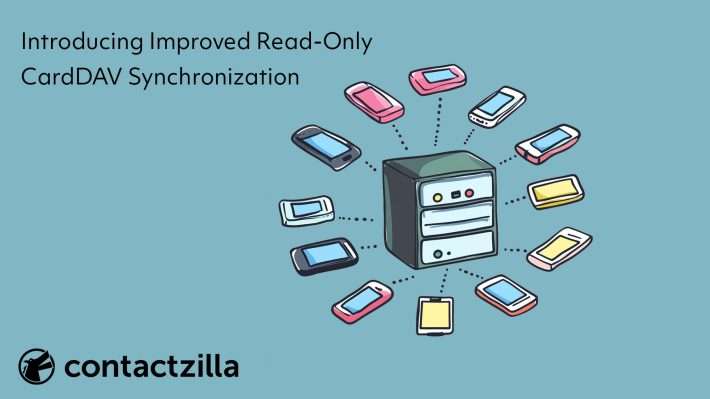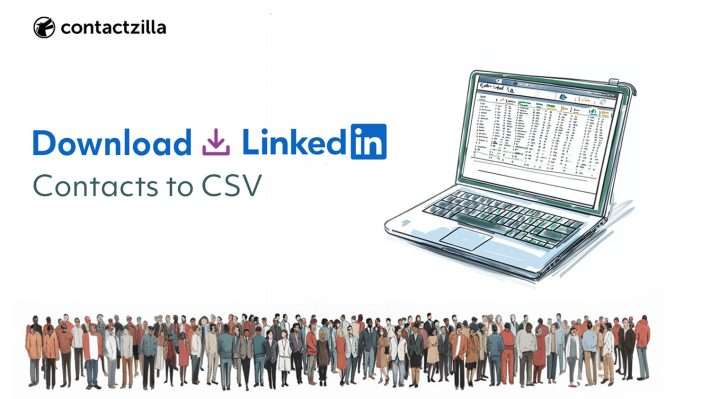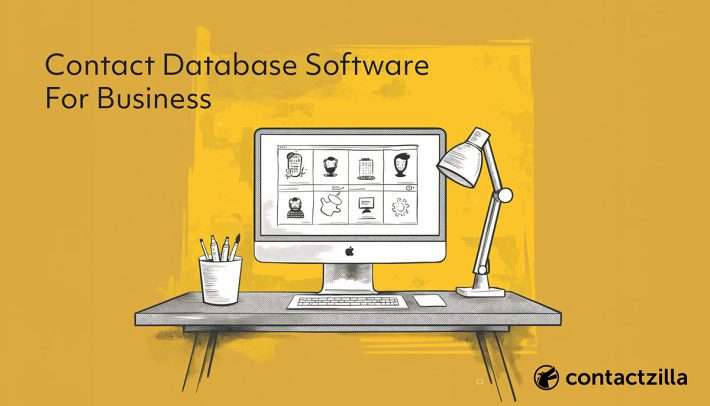CRM vs Contact Management: Which is Best for Your Business in 2024?
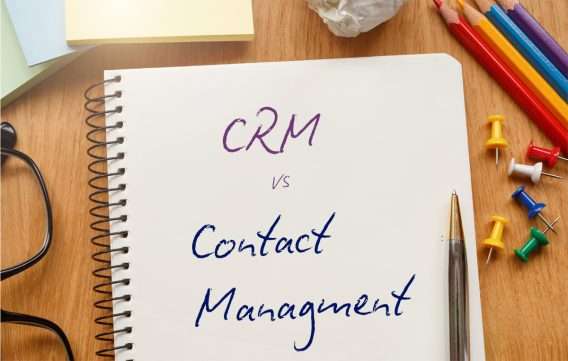
Navigating the sea of online tools for managing contacts and customers can feel overwhelming. The internet is awash with products that can help you, but that do slightly different things. The features of these products overlap yet cater to diverse needs. For small businesses evaluating CRM vs contact management solutions, the choice ultimately depends on your specific needs and growth plans. Understanding the key differences between CRM (Customer Relationship Management) software and Contact Management tools is crucial when selecting the right product for your needs. The right choice can help you more effectively attract, engage, and convert potential customers.
Tip: Discover tips on organizing contacts for better relationships.
Contact Management software Overview
Contact Management Tools are designed to organize all your customer information in a centralized database. Its primary function is to store detailed contact information, making it easy to access and manage. It seems obvious but by having all your contact information at your fingertips, you can quickly reach out to the right person at the right time, with the right message. The focus with Contact Management Software is simplicity and ease of use. It helps you manage contacts without unnecessary complexity, making it an appealing choice for those looking to streamline their processes and stay organized.
Key features

- Centralized Contact Management – Aggregates contacts from multiple sources into one centralized location.
- Contact Storage – Stores detailed contact details and key information often with customizable fields to accommodate names, phone numbers, email addresses, physical addresses, and any additional data you need.
- Team Access – Allows multiple staff members including sales reps to access and manage shared contact details.
- Segmentation – Will often give you the option of applying labels or tags to group contacts into segments.
- Interaction History – Keeps track of past communications with clients. These may be automated or in some cases a manual process of adding notes.
- Search and Grouping – Easily access specific contact data through search capabilities and grouping features.
- Mobile Access – Manage contacts on the go via phone or tablet.
- Activity Tracking – Basic tracking of activities and tasks related to contacts.
Ideal For: Smaller businesses or individuals who need a straightforward way to manage their contacts without the complexity of a full-scale CRM.
Share read-only contact lists across 100’s of devices
 14 DAY FREE TRIAL
14 DAY FREE TRIAL  NO CREDIT CARD REQUIRED
NO CREDIT CARD REQUIRED
CRM solution Overview
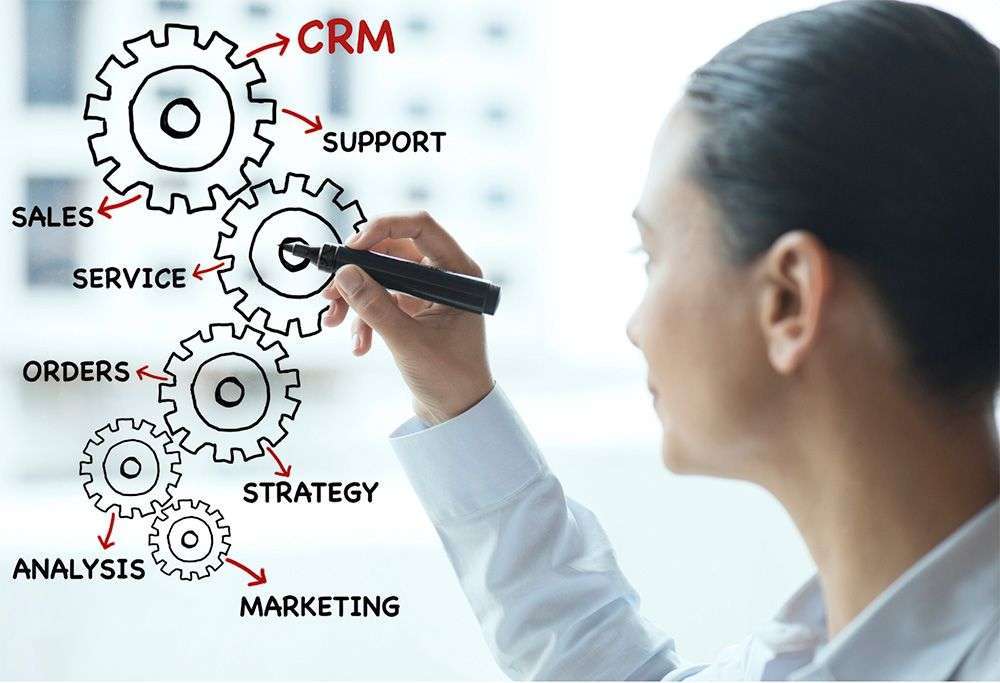
CRMs (Customer Relationship Management) go way beyond storing contact data. A CRM tool offers a more comprehensive approach to managing customer relationships and building customer loyalty, providing advanced tools for sales, marketing and customer support. They can work well in organisations where multiple people are dealing with the same customer perhaps for the first time, allowing different departments to collaborate more effectively and gain a holistic view of each customer’s journey. It allows anyone with access to the CRM to see the customer’s communication history, contact details and purchase history. CRM systems are complex beasts that help with selling and retaining customers.They allow you to strategically manage customer interactions and behaviours throughout their lifecycle, transforming data into actionable insights. A CRM can require a significant investment of resources and time to implement and maintain effectively so are a better consideration only if you need the additional features. They include all of the Contact Manager software features plus the following:
Key Features
- Comprehensive Tracking – Monitors the progress of sales leads and sales activities, helping sales teams stay aligned.
- Campaign Management: Tracks the progress of marketing and sales campaigns, ensuring cohesive strategies across teams.
- Automation and Efficiency – Automates email campaigns, follow-ups, and responses to streamline sales workflows, including the ability to create entire drip campaigns.
- Insightful Reporting – Generates detailed reports to highlight strengths and weaknesses in the sales pipeline, allowing you to set parameters for success.
- Marketing campaigns – With a robust CRM, you can set up a drip system that sends automated emails based on user behavior and interactions.
Ideal For: Businesses with complex sales cycles and multiple staff members interacting with customers.
Tip: Find out how our Contactzilla can help get your Contacts in sync across your team here.
Evaluating your Business needs
Choosing the right tool to manage your business contacts comes down to understanding your specific needs. Here are some key considerations and scenarios to guide your decision-making:
- How large is your customer base?
- Do you have a simple sales workflow or a more complex cycle that involves multiple touchpoints?
- What does your customer service workflow look like – is it straightforward or does it require detailed tracking and follow-ups?
- Will multiple team members be dealing with the same contact/customer?
- Do you need to automate marketing campaigns and follow-ups?
- How important are detailed analytics and reporting for your business decisions?
- Do you require integration with other tools, such as email, calendars, or project management software?
Scenarios to consider
Small Business with Simple Needs
If you run a small business with a straightforward sales process and a manageable number of customers, Contact Management software might be the perfect fit. It will help you keep your contact list organized, track basic interaction history, and allow your team members to access shared contacts. For example, a local bakery managing customer orders and vendor contacts can benefit greatly from Contact Management Software without the complexity of a CRM.
Growing Business
For growing businesses, both Contact Management Software and CRM can be useful. Contact Management Software can handle an expanding customer base with features like segmentation and multiple address books. However, if your growth includes more complex sales strategies, a CRM might be necessary to automate tasks and provide detailed reporting. For example, a mid-sized e-commerce store could start with a Contact Management and transition to a CRM as their sales cycles become more complex.
Customer-Focused Service Provider
If your business heavily relies on maintaining strong customer relationships and providing personalized service, a Contact Management solution with robust contact and interaction tracking can suffice if the processes are not too complex. However if your customer base is very large and you need to automate numerous follow-ups and manage detailed client interactions, a CRM can be essential. Consider a consultancy firm that needs to manage client relationships; a CRM will help automate follow-ups and track detailed interaction histories, whilst a Contact Management Software could still manage the basic contact info and notes efficiently.
Resource-Limited Startup
For startups or businesses with limited resources, starting with a Contact Managent solution can be a practical choice. A freelance graphic designer, for example, can use one to keep track of client contact details, project deadlines, and basic communication history without the need for a complex CRM system. As the business grows, transitioning to a CRM can be a natural next step to handle increased interaction complexity.
CRM vs Contact Management solutions – Advanced features
We know we’ve outgrown relying solely on spreadsheets for managing our contacts, but with so many solutions out there, how do we determine which platform is right for us? Understanding the more advanced features of both options can help you make the best choice for managing your customer relationships effectively.
Contact Management Solution
Beyond basic contact management, these solutions offer several advanced features to enhance functionality and efficiency:
| Feature | Description |
| Data Import and Export | Easily import contacts from various sources and export them as needed, ensuring seamless data migration and backup. |
| Integration with Communication Tools | Many CMS platforms integrate with email clients, phone systems, and social media, allowing for direct communication from within the system. |
| Advanced Search Capabilities | Utilize filters and advanced search functions to quickly find specific contacts or groups based on detailed criteria. |
| Tagging and Categorization | Use tags and categories to organize contacts by specific attributes, making segmentation and targeted communication easier. |
| Security and Permissions | Implement user permissions to control who can access and edit contacts, protecting sensitive data and ensuring contact data is available to the right staff member. |
| Scalability | Handle a growing contact list effortlessly, making it suitable for expanding businesses. |
CRM Software

A CRM is like having a business strategist at your fingertips. As well as storing customer data it helps you utilize the data to drive growth. Here are some of the more advanced features:
| Feature | Description |
| Sales Forecasting | Use predictive analytics to forecast sales trends and outcomes, aiding in strategic planning. |
| Marketing Automation | Create complex marketing campaigns with automated workflows, including personalized email sequences and targeted advertisements, allowing marketing teams to efficiently manage and execute strategies. |
| Customer Support Management | Track customer service tickets, manage service level agreements (SLAs), and monitor resolution times to improve customer satisfaction. |
| Customizable Dashboards | Personalize dashboards to display relevant information. |
| Social Media Integration | Integrate with social media platforms to monitor and engage with customers, providing a complete view of client interactions across channels. |
| Mobile CRM | Access CRM functionalities on mobile devices, ensuring that sales and service teams can work efficiently from anywhere. |
| AI and Machine Learning | Utilize AI-driven insights for lead scoring, sentiment analysis, and personalized customer recommendations. |
Key Differences Between CRM and Contact Management Software
Here’s a detailed comparison of the key features and functionalities between the platforms to help clarify what your business needs:
| Feature | CMS | CRM |
| Primary Functionality | Store and organize contacts | Manage and analyze customer engagements |
| Contact Management | Centralized contact storage with customizable fields | Comprehensive contact and relationship management |
| Automation | Basic notifications | Advanced automation for emails, follow-ups, and workflows |
| Integration | Integrates with email and phone systems | Extensive integrations including social media and project management tools |
| Reporting and Analytics | Basic interaction tracking | Detailed reports and analytics for sales, marketing, and customer service |
| Segmentation | Tagging and grouping | Advanced lead segmentation and customer categorization |
| Sales Funnel Management | N/A | Full sales funnel tracking and optimization |
| Scalability | Handles growing contact lists | Scales with business growth, managing complex data and interactions |
| Security and Permissions | Advanced role-based access control and data security | Advanced role-based access control and data security |
| Mobile Access | Manage contacts on the go across multiple devices and locations | Full CRM functionalities available on mobile devices |
| Activity Tracking | Basic tracking of activities and tasks | Comprehensive tracking of sales activities, service tickets, and customer interactions |
| Sales Forecasting | N/A | Predictive analytics and sales forecasting |
| Customer Support Management | Limited | Full management of customer service tickets and SLAs |
| Marketing Automation | N/A | Complex marketing campaigns with automated workflows |
| AI and Machine Learning | AI-driven insights for lead scoring and customer recommendations | AI-driven insights for lead scoring and customer recommendations |
CRM vs Contact Management – Cost considerations

It’s essential to consider not only the initial price but also the long-term value and return on investment (ROI) each system can provide.
| Aspect | CMS | CRM |
| Initial Investment | Typically lower; many options offer free or low-cost entry-level plans. Setup and training costs not necessary | Higher due to comprehensive features and capabilities; initial setup and training costs. |
| Ongoing Costs | Subscription fee will often include multiple users but can be on a per user basis. Can be considerably cheaper monthly cost | Regular subscription fees on a per user basis. Features, and storage dictate the price plan. Advanced functionality and add-on features (AI, marketing automation) add to costs. |
| Value | Ideal for small companies with straightforward contact management needs; includes organizational features that help improve client interactions relationships with minimal financial investment. | Potentially significant ROI by improving sales strategies, automating tasks, and offering detailed analytics; long-term benefits include increased sales efficiency, better customer retention, and more informed decision-making. |
Here are some example prices which are accurate at the time of writing.
Example Pricing
Contact Management Software Pricing
Contactzilla
- Team 3 – $19/month (up to 3 users)
- Team 10 – $49/month (up to 10 users)
- Team 100 – $99/month (up to 100 users)
Contactboss
- Boss Pro – $11.67/user/month
- Boss Premium – $13.33/user/month
Contacts Plus
- Premium – $9.99/month (up to 5 users)
- Teams – $12.99/user/month
CRM Pricing
Salesforce
- Starter Suite – $25/user/month
- Pro Suite – $100/user/month
Zoho CRM
- Standard – $14/user/month
- Pro – $23/user/month
Insightly
- Plus – $29/user/month
- Professional – $49/user/month
How Automation and Report Generation Differentiate CRM from Contact Management Systems
As businesses grow and customer interactions become more complex, the need for advanced tools like automation and reporting increases. While contact management systems work well for small businesses with straightforward customer relationships, CRM software offers capabilities that become increasingly valuable for medium to larger enterprises.
A study by Nucleus Research found that sales automation can increase productivity by 14.5% and reduce marketing overhead by 12.2%. CRMs automate repetitive tasks like follow-up emails, lead assignment, and deal tracking. This frees up sales reps to focus on building relationships and providing a more personalized customer experience.
One key area where CRMs differentiate themselves is in email marketing automation. While basic contact management software may allow you to send one-off emails to contact lists, CRMs often provide the ability to create intricate email sequences that are automatically triggered based on customer actions or lifecycle stages.
But automation alone isn’t enough. Managers need insights to make data-driven decisions. That’s where CRM reporting shines. According to Salesforce, high-performing sales teams are 1.5x more likely to base forecasts on data-driven insights.
CRMs provide real-time dashboards and customizable reports on sales activity, pipeline health, rep performance and more. Spotting trends and issues early allows for proactive strategizing. Contact management systems, in contrast, offer limited reporting focused mainly on contact data.
Interestingly, a LinkedIn survey revealed 43% of CRM users leverage less than half the features. So while CRMs are powerful, many companies have yet to fully tap their potential for automation and analytics. The key is aligning CRM capabilities with your specific sales workflows and KPIs.
Additional Considerations: CRM Implementation Impact
Implementing a CRM system can significantly transform your business operations, but it also comes with its own set of challenges and considerations. Here are some practical impacts to keep in mind:
Time and Resource Investment – Setting up a CRM requires substantial time and resources, including installation, customization, and training.
Potential Overcomplication – Without careful tailoring to your specific business needs, a CRM can become overly complex and cumbersome.
Ongoing Maintenance and Updates – Regular updates and maintenance are crucial to keep the CRM system running smoothly and securely.
User Adoption and Resistance – Ensuring all personnel adopt the new system can be challenging, with potential resistance to change.
Risk of Data Overload – Proper data management strategies are essential to avoid overwhelming users with too much information.
Finding Simplicity with ContactZilla – The perfect solution for small businesses
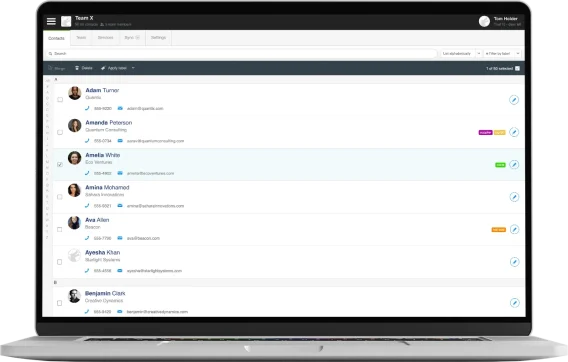
When comparing CRM vs contact management software the key is finding a solution that balances simplicity and functionality without overwhelming complexity. The ideal solution should streamline contact organization, improve team collaboration, and enhance customer relationships whilst being as straightforward and user friendly to use as possible. That’s where Contactzilla shines. We have stripped away the noise, focusing on what matters most – sharing contacts easily. We’ve intentionally pared down the complexity of traditional CRM features to focus on what small companies truly need: a straightforward, effective way to manage contacts.
Unlike contact management systems or complex CRM systems, ContactZilla is for all your contacts – including colleagues, suppliers and associates and yet allows you to keep your personal contacts private. It’s the ideal solution for small companies who need a shared address book that can be access by your team from anywhere on any device.
FAQ’s
Why should I use a CRM?
You should use a CRM to systematically manage customer interactions, sales processes, and after-sales support. It offers a centralized database for tracking customer history, preferences, and feedback, leading to improved customer satisfaction, loyalty, and ultimately, increased revenue and growth for your business.
Why should I use Contact Management Software?
You should use Contact Management Software to easily store, organize, and access your contact information. It simplifies managing contacts, improves communication, and helps maintain relationships with customers, suppliers, and colleagues. Ideal for small teams, it offers efficiency without unnecessary complexity.
What key functionalities define an effective contact management system?
An effective contact management system should include centralized contact storage, customizable fields, integration with communication tools, robust search capabilities, interaction history tracking, segmentation for targeted communication, security and permissions and mobile access. These features ensure efficient organization and easy access to contact information, enhancing overall communication and relationship management.
What is the difference between CRM and customer communication managment (CCM)?
CRM (Customer Relationship Management) focuses on managing all interactions with customers to enhance relationships and drive sales. CCM (Customer Communication Management) specifically handles the creation, delivery, and management of customer communications across various channels. CRM is broader, while CCM focuses on communication.
What is the difference between an ERP and a CRM?
ERP (Enterprise Resource Planning) integrates various business processes like finance, HR, and supply chain into one system. CRM (Customer Relationship Management) focuses on managing interactions with customers to improve relationships and boost sales. ERP is broader, covering multiple business functions, while CRM is customer-centric.
Are contact management and CRM two different concepts?
Yes, contact management and CRM are different. Contact management is a simpler system that stores customer contact details whilst allowing you to add notes and custom fields. CRM is more comprehensive, tracking a customer’s full interaction history, sales, and more, aimed at enhancing business relationships.
Try Contactzilla
Check out our contact management platform for streamlined contact organization and synchronization on all devices.
- Smooth contact syncing solutions tailored for businesses.
- Organize, manage, and share contacts within your team with ease.
- Apply custom tags and fields for improved contact sorting.
- Conveniently import contacts from any location.
- Affordable pricing with clarity, scaling with your business’s growth.
Claim your FREE trial here!
